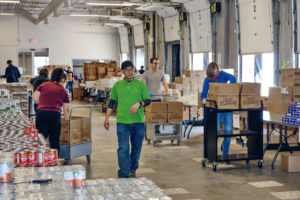Public Libraries: Responding in Times of Crisis
23 November 2021
Earlier this month more than 100 delegates joined Dr Sadie-Jane Nunis (Singapore Institute of Management), Vickery Bowles (Toronto Public Library) and Prof R. David Lankes (University of Texas at Austin’s School of Information) for a webinar facilitated by Erik Boekesteijn (National Library of the Netherlands) on how public libraries support communities during crises. In addition to highlighting the ways in which libraries across the world provided practical and emotional support to communities during the pandemic, the panel reflected on how these efforts reinforced the value of libraries as places where people are valued and can find meaning and on the skills of library staff in adapting and innovating according to local need.
Reflecting on how the Toronto Public Library system responded to the pandemic, Vickery Bowles advised that an early decision was taken to call senior patrons to check on their wellbeing (picture). TPL’s expertise in logistical management was also demonstrated when 12 branches were temporarily turned into foodbanks (with 2 still in operation). In addition, the city’s book distribution unit was transformed into a distribution hub, with teams of staff sorting and packing food (and donated books) for around 42 000 vulnerable citizens. As Toronto Life reported one library staff member as saying: “The library handles materials all the time. We do plenty of packing and unpacking. We work with communities. It just made sense.”

Dr Nunis explained how libraries has worked to develop packages of support for children, with an online programme designed to support parents of young children through stories and rhymes. As was the case in Toronto, library leaders in Singapore invested in training and support services for staff, to help them balance staff safety and wellbeing with the challenges of running reduced services and facing increased community need.
Professor Lankes noted that many of the services we saw provided by public libraries during 2020 were not those taught in library schools and that the past 18 months had seen a shift towards “community-based librarianship”, with community organisations and libraries working closely together to develop new offers in response to how the crisis was felt at neighbourhood level.
In reflecting on how the pandemic had changed their views about libraries, panellists were unanimous in their view that libraries had always been responsive to community needs, had always been trusted community partners. However, we were now seeing more and more examples of the way in which libraries were able to act as a bridge for other partners (including cities and public health partners) to reach into communities and engage in meaningful dialogue, which had reinforced and reimagined the role and importance of libraries.
A recording of this event is available here.
Don’t miss our next event on the IFLA Systematic Public Library of the Year on 24 November 2021. Register today!